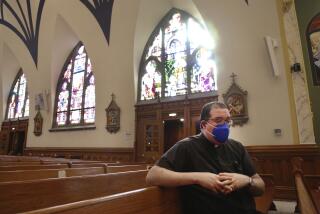A Closer Look at the Collection Plate
- Share via
NEW YORK — Why do Catholics give far less to the church than their Protestant counterparts?
A new survey of 625 Catholic and Protestant congregations doesn’t have all the answers, but it dispels a few myths, according to sociologist Dean Hoge of Catholic University of America.
Hoge’s survey throws cold water on the notion that alienated Catholics give less because they disagree with church teachings on such controversial subjects as birth control, abortion and the ordination of women. And it challenges the theory that financially pressed Catholics paying tuition for children in parochial schools have less to give on Sunday morning.
Hoge acknowledged that he still does not have a definitive explanation for why Catholics give less than one-third as much as their Protestant brethren on Sunday morning. But his survey noted that much of the difference in Catholic and Protestant giving patterns is concentrated in the high end of the income and education scales.
Among Protestants, the wealthy and well-educated tend to give much more than the poor. But among Catholics, the rich and educated give little more than those who are less well off.
“The theory that Catholics give less because of disagreement with Catholic moral teachings is false,” a summary of the findings says. “The theory that Catholics give less because they are angry is also false; the level of anger among Catholics is no higher than among . . . other denominations.”
Ranking denominations in terms of average per-member annual contributions, Hoge’s study concluded that Assemblies of God members were most generous, giving $628 per year, followed by members of the Presbyterian Church (U.S.A.), who gave $611; Southern Baptists, $550, and Evangelical Lutheran Church in America, $415. Roman Catholics ranked last, at $160 per member.
Differences in Catholic and Protestant church contributions are more pronounced when contributions are calculated by household rather than by individual. For the Assemblies of God, the annual household average was $1,696; Catholic households averaged $386.
The study found that the most generous givers are active participants in congregational life; maintain distinctive lifestyles, such as abstinence from alcohol, tobacco and certain kinds of entertainment; believe that the primary duty of Christians is to help others commit their lives to Jesus, and believe that tithing is important.
The study, funded by the Lilly Endowment, used data collected in 1992 and 1993 from 125 congregations in each of the five denominations. Almost 11,000 church members participated in the survey.
According to studies conducted by Empty Tomb Inc., a church stewardship group based in Champaign, Ill., church member giving as a percentage of U.S. per capita income was less in 1992 than in 1968.
Sylvia Ronsvalle, executive vice president of Empty Tomb, said many churches have “sold their birthright” by bringing in new members simply to fill the pews and collection plates.
According to Ronsvalle, church giving was historically seen as “the right thing to do” but now is linked to a strong consumer mentality: Members give in proportion to the services they receive.
More to Read
Sign up for Essential California
The most important California stories and recommendations in your inbox every morning.
You may occasionally receive promotional content from the Los Angeles Times.













